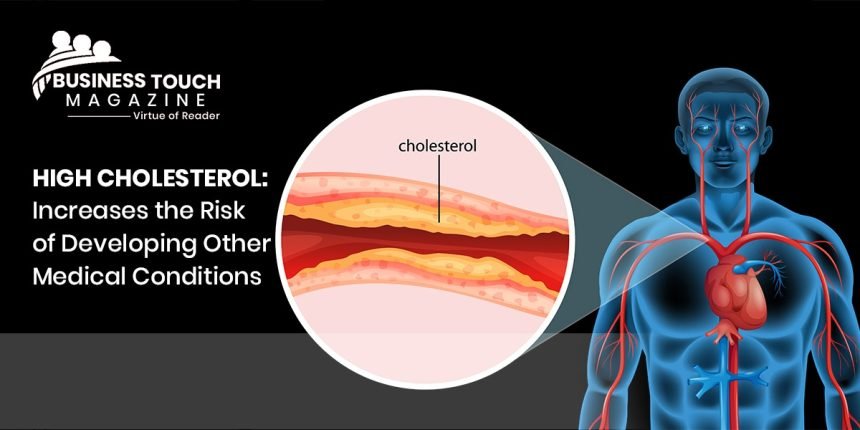Cholesterol is a fat-like, waxy substance that helps your body make cell membranes, many hormones, and vitamin D. The cholesterol in your blood comes from two sources: the foods you eat and your liver. Your liver makes all the cholesterol your body needs. We need a small amount of blood cholesterol because the body uses it to:
- build the structure of cell membranes
- make hormones like oestrogen, testosterone and adrenal hormones
- help your metabolism work efficiently, for example, cholesterol is essential for your body to produce vitamin D
- produce bile acids, which help the body digest fat and absorb important nutrients.
Cholesterol and other fats are carried in your bloodstream as spherical particles called lipoproteins. The two most commonly known lipoproteins are low-density lipoproteins (LDL) or bad cholesterol and high-density lipoproteins (HDL) or good cholesterol.
What is the difference between “good” cholesterol and “bad” cholesterol?
If your total cholesterol level is high because of a high LDL level, you may be at higher risk of heart disease or stroke. But, if your total cholesterol level is high only because of a high HDL level, you’re probably not at higher risk. Triglycerides are another type of fat in your blood. When you eat more calories than your body can use, it turns the extra calories into triglycerides.
Changing your lifestyle (diet and exercise) can improve your cholesterol levels, lower LDL and triglycerides, and raise HDL. Your ideal cholesterol level will depend on your risk for heart disease.
- Total cholesterol level – less than 200 is best, but it depends on your HDL and LDL levels.
- LDL cholesterol levels – less than 130 is best, but this depends on your risk for heart disease.
- HDL cholesterol levels – 60 or higher reduce your risk for heart disease.
- Triglycerides – less than 150 milligrams per deciliter (mg/dl) is best.
Does high cholesterol have symptoms?
Often, there are no specific symptoms of high cholesterol. You could have high cholesterol and not know it.
If you have high cholesterol, your body may store the extra cholesterol in your arteries. These are blood vessels that carry blood from your heart to the rest of your body. A build-up of cholesterol in your arteries is known as plaque. Over time, plaque can become hard and make your arteries narrow. Large deposits of plaque can completely block an artery. Cholesterol plaques can also break apart, leading to the formation of a blood clot that blocks the flow of blood.
Many people don’t discover that they have high cholesterol until they suffer one of these life-threatening events. Some people find out through routine check-ups that include blood tests. You can’t tell if you have high cholesterol without having it checked. A simple blood test will reveal your cholesterol level.
Men 35 years of age and older and women 45 years of age and older should have their cholesterol checked. Men and women 20 years of age and older who have risk factors for heart disease should have their cholesterol checked.
Cause of high cholesterol?
Your liver produces cholesterol, but you also get cholesterol from food. Eating too many foods that are high in fat can increase your cholesterol level. Being overweight and inactive also causes high cholesterol. If you are overweight, you most likely have a higher level of triglycerides. If you never exercise and aren’t active in general, it can lower your HDL (good cholesterol). Your family history also affects your cholesterol level. Research has shown that high cholesterol tends to run in families. Smoking also causes high cholesterol. It lowers your HDL (good cholesterol).
Foods that contain cholesterol, should be avoided
The cholesterol in your diet comes mainly from eggs and from animal products that are rich in fat such as meats and full-fat dairy foods. All foods from animals contain some cholesterol. Foods from plants do not contain cholesterol. The best way to have healthy levels of cholesterol in your diet is to limit foods high in saturated fats. Try to avoid:
- fatty meats
- processed meats like salami and sausages
- snack foods like chips
- most takeaway foods, especially deep-fried foods
- cakes, biscuits and pastries.
Dietary tips and lifestyle changes to avoid cholesterol
The most important thing you can do to reduce your cholesterol level is to maintain a healthy lifestyle. You should try to:
- Increase the amount and variety of fresh fruit, vegetables and wholegrain foods you have each day.
- Choose low or reduced-fat milk, yoghurt and other dairy products or have ‘added calcium’ soy drinks.
- Choose lean meat (meat trimmed of fat or labelled as ‘heart smart’).
- Limit fatty meats, including sausages and salami, and choose leaner sandwich meats like turkey breast or cooked lean chicken.
- Have fish (fresh or canned) at least twice a week.
- Replace butter and dairy blends with polyunsaturated margarine.
- Include foods in your diet that are rich in soluble fibre and healthy fats, such as nuts, legumes and seeds.
- Limit cheese and ice cream to twice a week.
- Cease alcohol consumption or reduce your alcohol intake to no more than one or two drinks a day. This may help lower your triglyceride levels.
- Don’t smoke. Smoking increases the ability of LDL cholesterol to get into artery cells and cause damage.
- Exercise regularly
- Lose any excess body fat.
- Control your blood sugar levels if you have diabetes.
Living with high cholesterol
If you have high cholesterol, you are twice as likely to develop heart disease. That is why it is important to have your cholesterol levels checked, especially if you have a family history of heart disease. Reducing your LDL “bad cholesterol” through good diet, exercise, and medicine can make a positive impact on your overall health.




